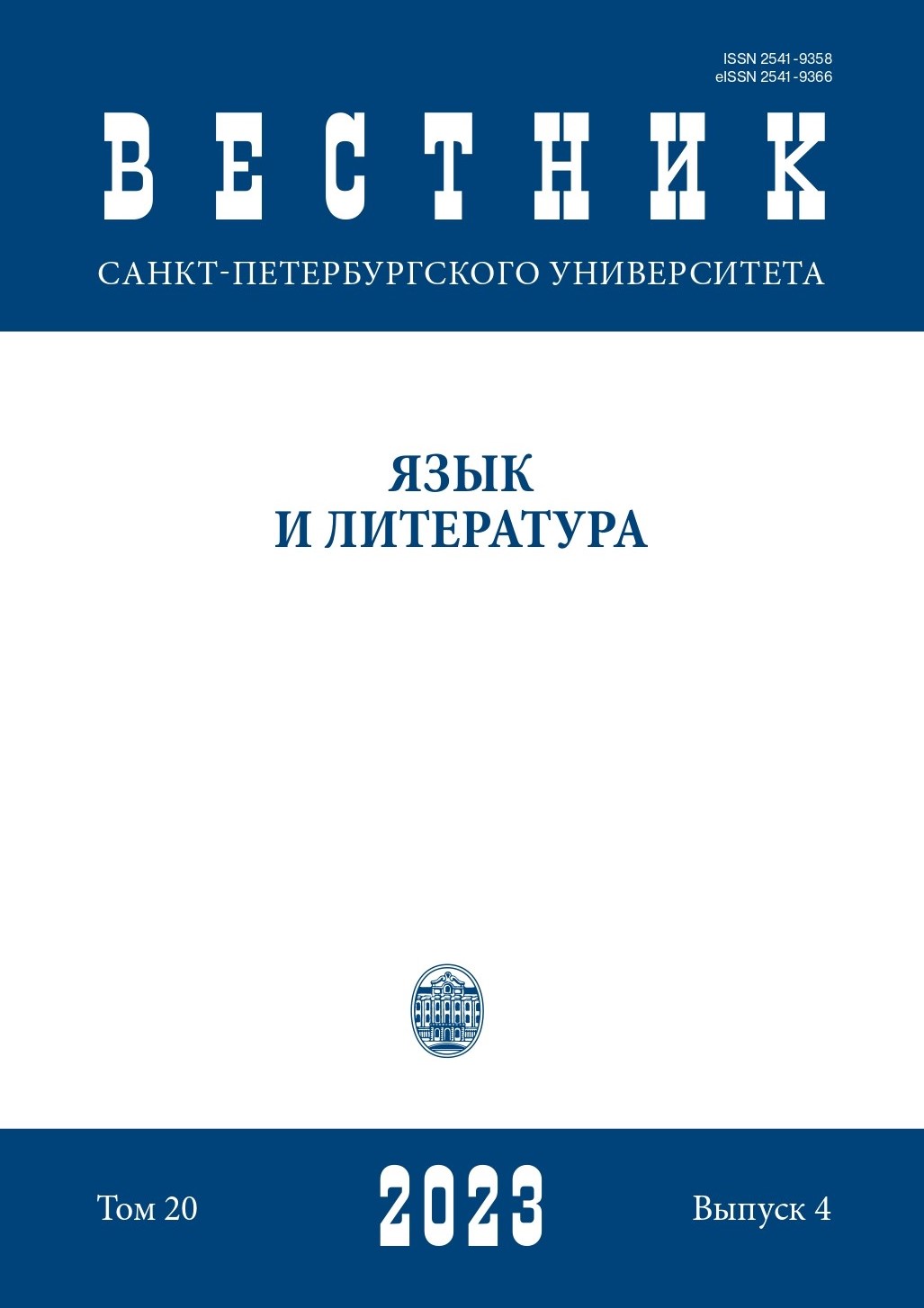Features of microtoponymy of the Ulyanovsk trans-Volga Region in the aspect of language contacts
DOI:
https://doi.org/10.21638/spbu09.2023.403Abstract
The purpose of the study is to describe the microtoponymy of the Ulyanovsk Trans-Volga
region. This territory includes the left-bank part of the modern Ulyanovsk region, that is,
the land between the Kuibyshev reservoir and the Bolshoi Cheremshan river. The microtoponyms
are analyzed in terms of their etymology. The material for this work was extracted
from records of interviews with dialect speakers from the villages of the left-bank districts
in the Ulyanovsk region. We have identified different types of place names in each thematic
group. The names can be motivated by appellative vocabulary, anthroponyms, natural objects
as well as appellatives. Most of the microtoponyms of the Ulyanovsk Trans-Volga region have
Russian etymology. In this group of toponyms, there are not lots of substrate units. There are many more borrowings among the names of large rivers in this polyethnic region. However, even among the microtoponyms we can find the results of language contacts. First of all, we can point out borrowings from Turkic languages. These are such examples, as Kaibela, Kurdyum, Chertany, Caraculy. Among the microtoponyms we also find loanwords of Finno-Ugric origin. These are mainly borrowings from the Mordovian languages: Pesha, Pochkarikha, Kurmysh,
Mary, Kokshay. Some loaned toponyms were transformed on the Russian basis and framed with Russian formants.
Keywords:
language contacts, Russian dialects, Turkic languages, Finno-Ugric languages, microtoponymy
Downloads
References
Литература
Беленов 2019 — Беленов Н. В. Принципы и методы топонимических исследований. Филологические науки. Вопросы теории и практики. 2019, 12 (4): 224–228. https://doi.org/10.30853/filnauki.2019.4.46
Беленов 2021 — Беленов Н. В. Лексико-семантический анализ топонимии чувашского села Большое Алдаркино Борского района Самарской области и его окрестностей. Oriental Studies. 2021, 14 (3): 595–605. https://doi.org/10.22162/2619-0990-2021-55-3-595-605
Березович 2000 — Березович Е. Л. Русская топонимия в этнолингвистическом аспекте. Екатеринбург: Изд-во УрГУ, 2000.
Бурдин 2017 — Бурдин Е. А. Затопленные святыни Симбирского-Ульяновского края. Ульяновск: Корпорация технологий продвижения, 2017.
Каштанов 1998 — Каштанов С. М. Экономическая политика русского правительства в Казанском крае в начале 60-х годов XVI в. Сообщения Ростовского музея. 1998, (9): 45–56.
Мордвинов 2007 — Мордвинов Ю. Н. Взгляд в прошлое: из истории селений Старо-майнского района: версии, события, размышления, воспоминания. Ульяновск: Караван, 2007.
Полубояров 2010 — Полубояров М. С. Древности Пензенского края в зеркале топонимики. М.: Изд-во ЗАО «ФОН», 2010.
Порунов 2015 — Порунов А. Н. К вопросу о стратиграфии топонимов Среднего Поволжья. Вестник Мордовского университета. 2015, 25 (3): 66–72. https://doi.org/10.15507/vmu.025.201503.066
Садыкова 2003 — Садыкова Р. К. Историко-лингвистический анализ тюрко-татарской топонимии Ульяновской области Российской Федерации. Автореф. дис. … канд. филол. наук. Казань: Казанский гос. ун-т им. В. И. Ульянова-Ленина, 2003.
Сывороткин 2004 — Сывороткин М. М. Система адаптации заимствованной лексики тюркского и финно-угорского происхождения в современных русских говорах Окско-Волжско-Сурского региона. Саранск: [б. и.], 2004.
Referenсes
Беленов 2019 — Belenov N. V. Principles and methods of toponymic research. Filologicheskie nauki. Voprosy teorii i praktiki. 2019, 12 (4): 224–228. https://doi.org/10.30853/filnauki.2019.4.46 (In Russian)
Беленов 2021 — Belenov N. V. Lexico-semantic analysis of the toponymy of the Chuvash village of BolshoeAldarkino, Borsky district, Samara region and its environs. Oriental Studies. 2021, 14 (3): 595–605.https://doi.org/10.22162/2619-0990-2021-55-3-595-605 (In Russian)
Березович 2000 — Berezovich E. L. Russian toponymy in the ethnolinguistic aspect. Ekaterinburg: Izdatel’stvoUral’skogo universiteta Publ., 2000. (In Russian)
Бурдин 2017 — Burdin E. A. Flooded shrines of the Simbirsk-Ulyanovsk Territory. Ul’ianovsk: Korporatsiia tekhnologii prodvizheniia Publ., 2017. (In Russian)
Каштанов 1998 — Kashtanov S. M. The Economic Policy of the Russian Government in the Kazan Regionin the Early 60s of the 16th Century. Soobshcheniia Rostovskogo muzeia, 1998, (9): 45–56. (In Russian)
Мордвинов 2007 — Mordvinov Iu. N. A look into the past: from the history of the villages of Staraia Maina region: versions, events, reflections, memories. Ulyanovsk: Karavan Publ., 2007. (In Russian)
Полубояров 2010 — Poluboyarov M. S. Antiquities of the Penza Region in the Mirror of Toponymy. Moscow: ZAO “FON” Publ., 2010. (In Russian)
Порунов 2015 — Porunov A. N. On the Question of the Stratigraphy of Place Names in the Middle Volga Region. Vestnik Mordovskogo universiteta. 2015, 25 (3): 66–72. https://doi.org/10.15507/vmu.025.201503.066. (In Russian)
Садыкова 2003 — Sadykova R. K. Historical and Linguistic Analysis of the Turkic-Tatar Toponymy of the Ulyanovsk Region of the Russian Federation. PhD thesis abstract. Kazan: Kazanskiy gos. un-t im. Ul’yanova-Lenina Publ., 2003. (In Russian)
Сывороткин 2004 — Syvorotkin M. M. Adaptation system of borrowed vocabulary of Turkic and Finno-Ugric origin in modern Russian dialects of the Oksko-Volga-Sur region. Saransk: [s. n.], 2004. (In Russian)
Downloads
Published
How to Cite
Issue
Section
License
Articles of "Vestnik of Saint Petersburg University. Language and Literature" are open access distributed under the terms of the License Agreement with Saint Petersburg State University, which permits to the authors unrestricted distribution and self-archiving free of charge.






